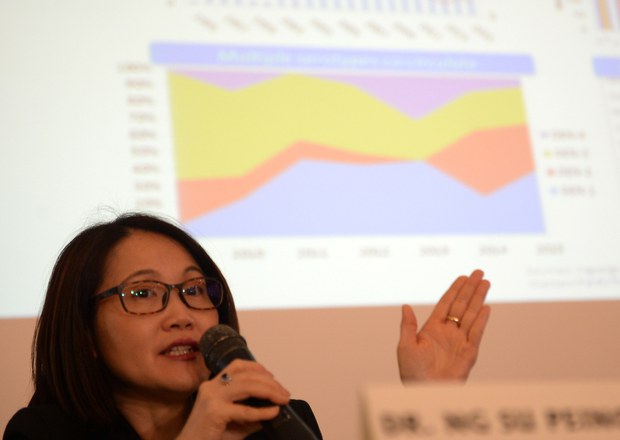Philippines Launches Probe into Dengue Immunization Program
2017.12.04
Manila
 Dr. Ng Su-Peing, the global medical chief of Sanofi Pasteur, addresses a press conference in Manila following a decision by the Philippine government to investigate the French pharmaceutical firm’s dengue vaccine, Dec. 4, 2017.
Dr. Ng Su-Peing, the global medical chief of Sanofi Pasteur, addresses a press conference in Manila following a decision by the Philippine government to investigate the French pharmaceutical firm’s dengue vaccine, Dec. 4, 2017.
Philippine justice officials Monday ordered an investigation into a school-based anti-dengue immunization program after the country’s health department suspended it over a French pharmaceutical firm’s disclosure that its flagship vaccine could put people with no prior infection at risk.
Department Order 763, signed by Justice Secretary Vitaliano Aguirre, directs the National Bureau of Investigation to “conduct [an] investigation and case build up” into the program in which more than 740,000 Philippine schoolchildren were given shots of Dengvaxia, a vaccine developed by Sanofi Pasteur.
The government is particularly concerned about an alleged irregular procurement deal with Sanofi Pasteur last year valued at 3.5 billion pesos (U.S. $69 million) that made the Philippines the first country in Asia to use the drug, Aguirre said in the order.
Should evidence be found, appropriate charges should be filed, the order said. It did not name individuals to be covered in its probe.
On Sunday, presidential spokesman Harry Roque appealed for parents and relatives of public elementary school children in Manila and nearby provinces, where pilot testing was done last year, to remain calm. He called on people to not spread unverified information that could cause undue panic.
“We assure the public that as per the Department of Health there is currently no reported case of severe dengue infection to the individuals who received one dose of dengue vaccine last year,” Roque said.
“We will leave no stone unturned in making those responsible for this shameless public health scam which puts hundreds of thousands of young lives at risk accountable,” he said in a statement.
The Department of Health is coordinating with the Department of Education to monitor thousands of students who have been vaccinated with Dengvaxia, Roque added.
The vaccination program had been hailed by the World Health Organization, which recommended that the government undertake a massive immunization project to combat dengue.
Dengue fever and dengue hemorrhagic fever are acute viral infections known to affect infants, young children and adults. It is transmitted by a bite of an Aedes aegypti mosquito infected with any one of the four dengue strains.
The disease infects about 200,000 Filipinos every year, and the health department had hinted that the suspension was only temporary.
In a statement issued last week, Sanofi said it would propose that national regulatory agencies update labels in their stocks of the drugs to request that “healthcare professionals assess the likelihood of prior dengue infection in an individual before vaccinating.”
But health advocates had warned that it was too soon to roll out the vaccine in 2016. In December 2015, the Philippines approved the commercial sale of Dengvaxia, the first dengue vaccine developed by Sanofi, and it became commercially available here four months later.
Database
On Monday, Sen. Risa Hontiveros, vice chairwoman of a congressional committee on health and demography, called on government to create a database of all children who had received dosages of the vaccine.
Preliminary studies showed that nearly 10 percent of the nearly three-quarters of a million children who received Dengvaxia could be at risk, she said.
“Our primary concern right now should be the health and welfare of all those children exposed to unnecessary risk,” Hontiveros said. “Laxity is not an option. We are racing against time. We must protect and ensure the good health of the children.”
The French firm “must be held responsible and culpable health officials accountable,” she added.
“While vaccination and immunization are protective and essential elements of preventive health care, implementing an immunization program that could do more harm than good to our children is the height of negligence that could border on the criminal,” Hontiveros said.
Sanofi: full transparency
In a statement issued in Manila on Monday, Sanofi said it had made the finding public “in full transparency” with the Philippine Food and Drug Administration and the health department.
“Consequently, we are proposing an update to the current vaccine label that physicians can make appropriate vaccination decisions with their patients to enhance the impact of the vaccine in the Philippines, where majority have been infected by dengue by the time they reach adolescence,” Sanofi said.
It said Dengvaxia “does not contain viruses that can make people ill with dengue or severe dengue,” noting that “severe dengue” dengue infections were common complications.
Severe dengue is characterized as a potentially deadly complication “due to plasma leaking, fluid accumulation, respiratory distress, severe bleeding or organ impairment,” according to the World Health Organization.
“As far as we know, as far as we are made aware, there are no reported deaths that are related to dengue vaccination,” said Ruby Dizon, Sanofi’s medical director in the Philippines.
Former Philippine Health Secretary Janette Garin said the vaccination program was implemented in accordance with internationally set guidelines and that the government had consulted regularly with WHO’s Strategic Advisory Group of Experts on immunization.
“With the desire to resolve this deadly virus, the department started the vaccination program which has until now been seen to be strongly beneficial to nine out of 10 Filipinos,” Garin told BenarNews. “I welcome the DOJ (justice department) and Senate investigations. I will answer all questions at the right time, at the appropriate forum.”
She said that, should authorities “point culpability” to her way, “I am ready to face consequences.”
Froilan Gallardo in Cagayan de Oro, Philippines, contributed to this report.







